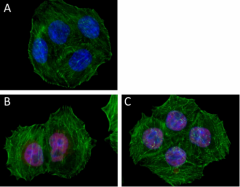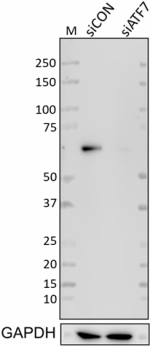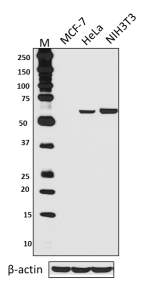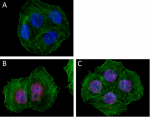- Clone
- W16152A (See other available formats)
- Regulatory Status
- RUO
- Other Names
- Cyclic AMP-dependent transcription factor ATF-7, Transcription factor ATF-A
- Isotype
- Rat IgG2a, κ
- Ave. Rating
- Submit a Review
- Product Citations
- publications

-

HeLa cells were fixed with 4% paraformaldehyde (PFA) for 15 minutes, permeabilized with 0.5% Triton X-100 for 3 minutes, and blocked with 5% FBS for 60 minutes. Then the cells were intracellularly stained overnight at 4°C with (A) 1: 1000 diluted (0.5 µg/ml) Alexa Fluor® 594 Rat IgG2a or with Alexa Fluor® 594 anti-ATF7 antibody (red) at (B) 1: 1000 (0.5 µg/ml) and (C) 1: 2500 (0.2 µg/ml, Figure C) dilution. Nuclei were counterstained with DAPI (blue). Actin filaments were labeled with Flash Phalloidin™ Green 488 (green). The image was captured with a 60X objective.
| Cat # | Size | Price | Quantity Check Availability | Save | ||
|---|---|---|---|---|---|---|
| 697303 | 25 µg | 128€ | ||||
Activating Transcription Factor 7 (ATF7) is a member of the ATF/cAMP response element-binding protein family. Among these ATF family members, ATF7 shares highly structurally conserved N-terminal activation domain and the C-terminal DNA binding/dimerization domain with ATF2. ATF7 has no intrinsic transcriptional activity and forms functional heterodimers with c-Jun or c-Fos proteins. Upon stimulation, such as pathogen infection and various stresses, ATF7 is phosphorylated by stress‐activated protein kinase p38 at Thr51 and Thr53 and in turn resulted in the activation of ATF7 target genes. In the absence of stress, ATF silences targets genes by recruiting histone methyltransferases, leading to the formation of heterochromatin. ATF7 deficient mice die soon after birth. Double knockout mutations of ATF2 and ATF7 lead to prenatal lethality with abnormalities in liver and heart.
Product DetailsProduct Details
- Verified Reactivity
- Human, Mouse
- Antibody Type
- Monoclonal
- Host Species
- Rat
- Formulation
- Phosphate-buffered solution, pH 7.2, containing 0.09% sodium azide.
- Preparation
- The antibody was purified by affinity chromatography and conjugated with Alexa Fluor® 594 under optimal conditions.
- Concentration
- 0.5 mg/ml
- Storage & Handling
- The antibody solution should be stored undiluted between 2°C and 8°C, and protected from prolonged exposure to light. Do not freeze.
- Application
-
ICC - Quality tested
- Recommended Usage
-
Each lot of this antibody is quality control tested by immunocytochemistry. For immunocytochemistry, a concentration range of 0.2 - 0.5 μg/ml (1:1000 - 1:2500 dilution) is recommended. It is recommended that the reagent be titrated for optimal performance for each application.
* Alexa Fluor® 594 has an excitation maximum of 590 nm, and a maximum emission of 617 nm.
Alexa Fluor® and Pacific Blue™ are trademarks of Life Technologies Corporation.
View full statement regarding label licenses - RRID
-
AB_2721373 (BioLegend Cat. No. 697303)
Antigen Details
- Structure
- 494 amino acids with a predicted molecular weight of 53 kD. Contains a N-terminal transactivation domain and a C-terminal bZIP DNA binding domain.
- Distribution
-
Nucleus
- Function
- ATF7 is a transcription factor belonging to the the ATF/cAMP response element-binding protein family. ATF7 is involved in early cell signaling and is activated in response to pathogen infection and stress.
- Interaction
- Forms a homodimer or a heterodimer with c-Jun, c-Fos, and other ATF family proteins. Interacts with JNK2, TAF12, TAF4, and MAPK9.
- Biology Area
- Cell Biology
- Antigen References
-
1. Yoshida K, Ishii S. 2016. Cell Cycle. 15:3.
2. Yoshida K, et al. 2015. Nat. Immunol. 16:1034.
3. Schaeffer E, et al. 2015. Cell Cycle. 14:2655.
4. Shivers RP, et al. 2010. PLoS Genet. 6:e1000892.
5. Camuzeaux B, et al. 2008. J. Mol. Biol. 384:980.
6. Breitwieser W, et al. 2007. Genes. Dev. 21:2069. - Gene ID
- 11016 View all products for this Gene ID
- UniProt
- View information about ATF7 on UniProt.org
Related Pages & Pathways
Pages
Related FAQs
Other Formats
View All ATF7 Reagents Request Custom Conjugation| Description | Clone | Applications |
|---|---|---|
| Purified anti-ATF7 | W16152A | WB,ICC |
| Alexa Fluor® 594 anti-ATF7 | W16152A | ICC |
Compare Data Across All Formats
This data display is provided for general comparisons between formats.
Your actual data may vary due to variations in samples, target cells, instruments and their settings, staining conditions, and other factors.
If you need assistance with selecting the best format contact our expert technical support team.
-
Purified anti-ATF7

Whole cell extracts (15 µg protein) from HEK293 cells transf... 
Total cell lysates (15µg protein) from MCF-7 (negative contr... 
HeLa cells were fixed with 4% paraformaldehyde (PFA) for 15 ... -
Alexa Fluor® 594 anti-ATF7

HeLa cells were fixed with 4% paraformaldehyde (PFA) for 15...

 Login / Register
Login / Register 













Follow Us